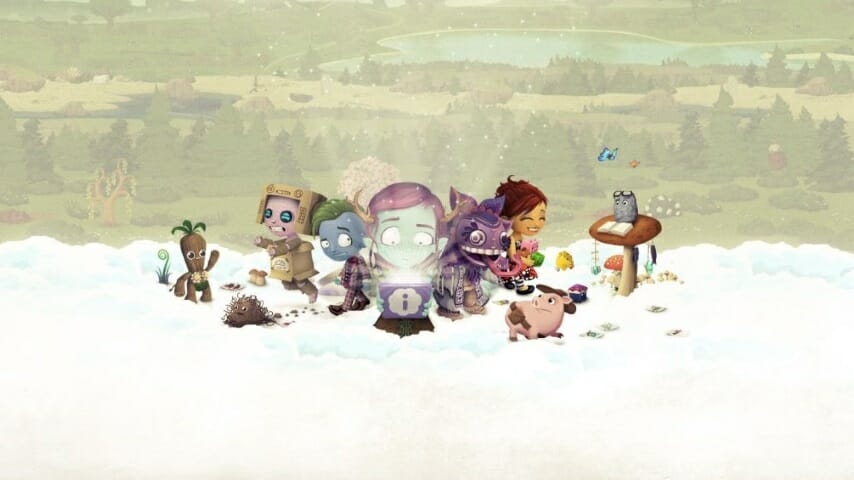Even When Games Finally Go Offline, We’ll Always Have Their Soundtracks
Audio Logs #16

This week Audio Logs is an ode to games, grandfathers, and bittersweet endings as we celebrate Glitch, the low-key browser-based MMO that ran from September 27th, 2011 until December 9, 2012. In that brief wonderful year, it exploded with character and vitality. And while the world of Ur may be shut down forever, its soundtrack grooves on.
My partner and I finally watched the series finale of Adventure Time this week. At the end, I got up and muttered, “that was one of the most successful endings for a show.” And my partner asked me if I was tearing up a little. I started to choke out a yes, and then fell completely apart.
“I miss my grandfather” and “he really would have liked that” were all I could get out to explain the sudden burst of not-entirely sadness fueled grief.
My too-tall Czech Chicagoan grandfather was a commercial artist who spent his retirement walking the beaches of Manatee County, Fla., rescuing turtles, and watching British comedies on PBS with my grandmother. When he wasn’t doing that he was making quirky, self-insert illustrated books for me. He loved YA lit, particularly fantasy, sci-fi and quirky animation. He died before Adventure Time premiered, years before I would begin watching it. He hated endings that robbed people of a space for their own possibilities or didn’t take their audience’s continued imagination seriously. He would have loved Adventure Time. Especially its conclusion.
So, this week a confluence of things has informed my selection. I’d spent the weekend thinking about Macross, and currently have a headful of early women game composers. But we decided to watch Adventure Time. And that set me on a path thinking about endings and loss, and sharing experiences, and I ended up at Glitch (whose birthday is coming up next week). My grandfather would have loved the crap out of Glitch. Well, if he could deal with computers at all.
Glitch was a 2D, side-scrolling, browser-based mmo by Tiny Speck with a team largely drawing from former Flickr devs in 2011. It would eventually close down due to dwindling population, but before creator Stewart Butterfield would close shop to turn the in-house communication tools into Slack and become even more phenomenally wealthy, it was a beloved, low-pressure virtual world.
My partner and I found ourselves playing it, huddled over our laptops or sprawled across the floor of our first apartment in New York. Between breaks when I wasn’t scrambling to write fundraising copy and they weren’t in production mode for the online literary journal they would eventually run, we would tab over to the world of Ur and hang out, milking butterflies (they named one of theirs Gary Oldman), gathering weird materials to craft weirder stuff, completing quests, or just hanging out in the beautiful spaces primarily brought to life by Glitch’s art director Brent “Meowza” Kobayashi.
Glitch even had Katamari and Wattam creator Keita Takahashi contributing to its design.
While my partner maximized their time, unlocking everything they could, shooting up the leaderboards, racking up achievement after achievement, I spent most of my time marveling at their success and dedication (and their damn in-game house) while constantly getting lost in the world (literally) and embracing the accompanying soundtrack. This was my chill-out space, and the sounds of Ur are amazing to chill out to.
Ambient and atmospheric, Daniel Simmons’ score had to encapsulate and evoke an entire world that was as familiar and inviting as it was strange and invigorating—even if it was a fairly rudimentary and casual one. There was a depth to the music that imbued the simple mechanics and play loops with the impression of a full richness. Glitch was a world where banjo and fiddle plunked in and out of harmony with slow marimbas. Berimbau dances gently with pedal steel and clarinet from bog to savannah and on to alpine landscapes. Sometimes a persistent, skittish clarinet sticks its head out as it darts in and out of the leafy cover of New Orleans jazz flute. It’s the only instance of a game I can think of that can cite double bass, tablas, and resonator guitar alongside a punctuation of diegetic synthesizer slurps and blorps.
All exquisitely alien, all immediately familiar—and as harming and quirky as it is unobstructive and technically challenging.
Glitch ended on December 9, 2012. The clock ticked down, players gathered and grieved the too-soon departure of the game they loved, and celebrated the times they had. And then…That was it. The game went away, and everyone went on with their lives. The Canadian billionaire born Dharma Jeremy Butterfield would continue on as one of those entrepreneur billionaire types, “gifting” the world Slack, but, I’ll credit him this much: Glitch was wonderful, and sad as it was to see it shut down, he gave it an ending as good as any I’ve ever seen.
We had time to say goodbye, to linger a little longer in this world and tie up loose ends. And when it was all over, art assets and huge chunks of source code were made open source, allowing a number of post-Glitch revival projects to spring up. My partner tried one of these revival projects and ran into former Glitch players who recognized them. The main Glitch website still maintains as much of a history of the game and it’s player base as possible. While nothing may ever replace Glitch or bring that world back truly, its send-off and preservation have at least let those of us who found a space to escape to keep pieces of it alive in a material way.
And, of course, we’ll always have the soundtrack. Long live Glitch.
Audio Logs is Dia Lacina’s weekly non-linear, non-hierarchical aural odyssey through gaming’s great soundtracks.
Dia Lacina is a queer indigenous writer and photographer. She tweets too much at @dialacina.